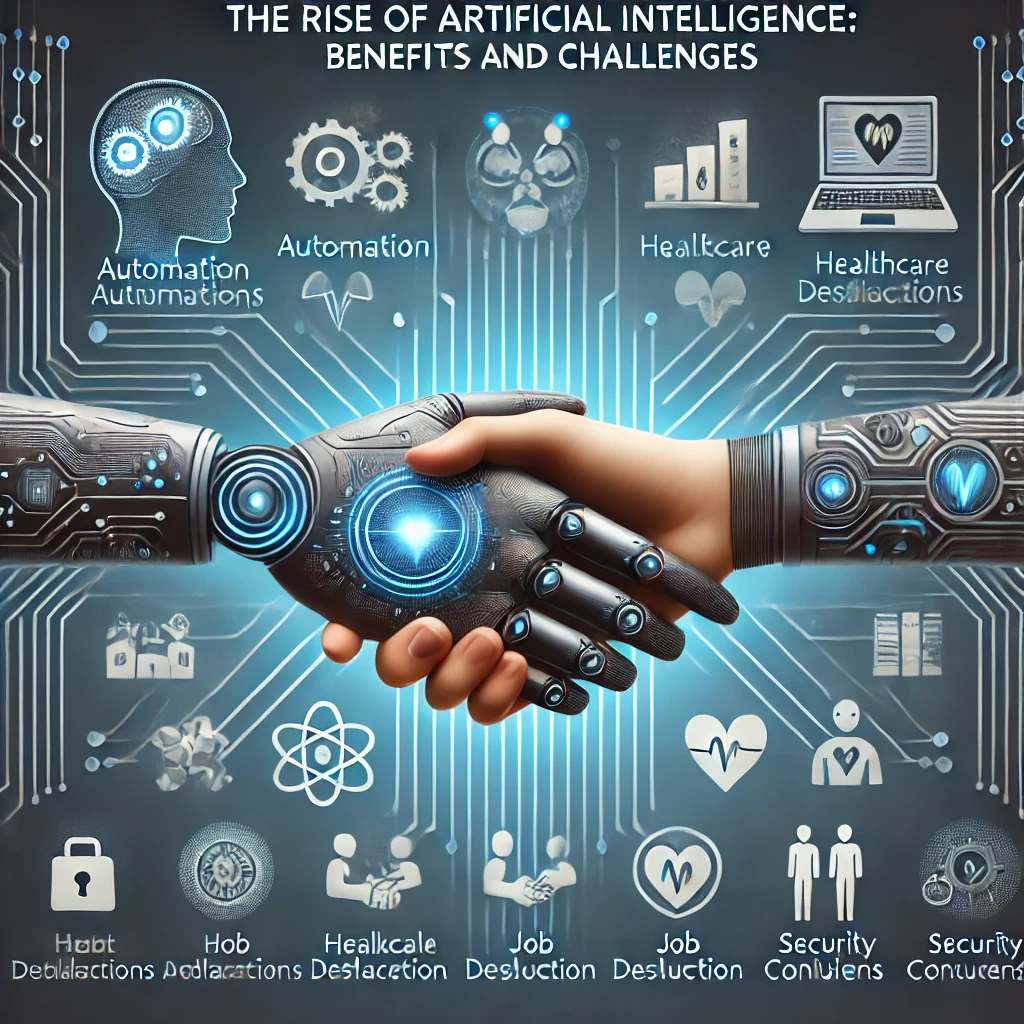-
How Digital Nomads Are Redefining Work and Lifestyle 🌍💻
Mar 06, 2025 | 38 Comments -
How Artificial Intelligence is Transforming Healthcare 🏥🤖
Mar 06, 2025 | 0 Comments -
How Cryptocurrency is Reshaping the Global Economy 💰🌍
Mar 06, 2025 | 0 Comments -
How to Build a Strong Personal Brand: Stand Out & Grow Your Influence 🚀📢
Mar 02, 2025 | 0 Comments -
The Power of AI in Business: How Artificial Intelligence is Transforming Industries 🚀🤖
Mar 02, 2025 | 0 Comments -
How Smart Homes Are Changing the Way We Live 🏡🔋
Mar 02, 2025 | 0 Comments -
How Electric Vehicles Are Revolutionizing Transportation 🚗⚡
Mar 02, 2025 | 0 Comments -
The Future of Renewable Energy: How Green Technology is Changing the World 🌍⚡
Mar 02, 2025 | 0 Comments

The Rise of Artificial Intelligence: Benefits and Challenges
Introduction
Artificial Intelligence (AI) is no longer a concept of the future; it is actively shaping our present. From simplifying daily tasks to solving complex problems, AI is revolutionizing industries and influencing how we live, work, and communicate. Its rapid advancement over the past decade has introduced transformative solutions, ranging from virtual assistants like Siri and Alexa to complex algorithms predicting weather patterns and diagnosing diseases. This article explores the multifaceted nature of AI, its benefits, challenges, and its profound potential for the future.
As AI technologies continue to evolve, they bring unprecedented opportunities and challenges, making it essential to understand their impact. Whether it’s automating mundane tasks or creating entirely new possibilities, AI is poised to redefine human interaction with technology.
Key Benefits of AI
Artificial Intelligence has introduced numerous benefits across various sectors, reshaping industries and improving lives. Below are some key advantages:
- Efficiency and Automation:
AI-powered systems have significantly enhanced productivity by automating repetitive and time-consuming tasks. For instance, robotic process automation (RPA) in banking and finance helps streamline operations like data entry, transaction processing, and fraud detection. This efficiency allows businesses to save time and focus on higher-value activities, boosting overall productivity.
- Enhanced Decision-Making:
AI provides actionable insights through advanced data analysis, enabling businesses and governments to make data-driven decisions. In healthcare, for example, AI-driven diagnostic tools can analyze medical images with precision, assisting doctors in identifying diseases such as cancer in their early stages.
- Personalization:
AI enhances customer experiences by tailoring services to individual needs. Streaming platforms like Netflix and Spotify use AI algorithms to analyze user behavior and preferences, delivering personalized recommendations that keep users engaged and satisfied.
- Improved Healthcare:
The healthcare sector has experienced groundbreaking advancements due to AI. Predictive analytics help identify potential outbreaks of diseases, while AI-driven drug discovery accelerates the development of life-saving medications. Additionally, wearable AI-powered devices monitor patient vitals in real time, reducing the risk of complications.
Challenges of AI
Despite its benefits, AI poses significant challenges that require careful consideration. Addressing these challenges is crucial to ensuring its responsible and ethical use:
- Job Displacement:
The automation of tasks, while increasing efficiency, can lead to job losses in sectors heavily reliant on manual labor. For example, manufacturing industries adopting AI-driven machinery may reduce the need for human workers, creating a growing demand for reskilling and retraining programs.
- Bias and Ethics:
AI systems are only as good as the data they are trained on. Biased datasets can result in discriminatory outcomes, particularly in areas like hiring or law enforcement. For instance, facial recognition algorithms have faced criticism for misidentifying individuals from minority groups, highlighting the need for ethical oversight.
- Privacy Concerns:
The integration of AI in data analytics raises concerns about user privacy and data security. Companies collecting vast amounts of personal information must implement robust measures to prevent breaches and misuse of sensitive data.
- Dependence on Technology:
Over-reliance on AI systems could make societies vulnerable to technical failures or cyberattacks. For instance, if critical infrastructure systems powered by AI—such as power grids or transportation networks—fail, the consequences could be catastrophic.
The Future of AI
The future of AI is filled with potential, offering solutions to some of humanity’s greatest challenges while opening doors to new opportunities. Innovations in areas like autonomous vehicles, natural language processing, and quantum computing promise to revolutionize industries.
For example, autonomous vehicles powered by AI could significantly reduce traffic accidents caused by human error, saving thousands of lives annually. AI in education can create personalized learning experiences, adapting to the unique needs of students and improving educational outcomes worldwide.
However, the road ahead requires careful planning. Governments and organizations must establish regulatory frameworks to address ethical concerns, ensure transparency, and promote fairness in AI development. Collaboration among policymakers, technologists, and ethicists will be vital in shaping AI’s future to benefit society as a whole.
As AI continues to advance, the need for public awareness and dialogue grows. Understanding its potential, limitations, and ethical implications will empower individuals and communities to navigate the evolving technological landscape effectively.
0 comments
No comments yet. Be the first to comment!
Your comment